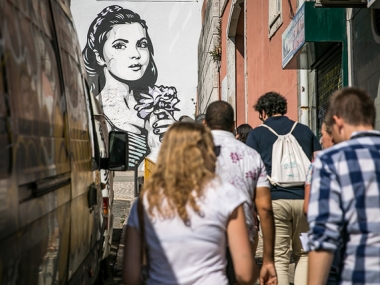Cities pushing the agenda for cultural inclusion
Edited on
13 September 2021As part of the Urban Agenda Partnership on Culture/ Cultural Heritage, URBACT is leading on two timely actions exploring the interface between cities and culture.

The Partnership on Culture/ Cultural Heritage, created in November 2018 under the Urban Agenda for the EU, is aimed at identifying and promoting actions that improve the legislation, the financial capacity and the knowledge transfer in the field of culture and cultural heritage at EU level.
Regulating the sharing economy
Under the ‘better regulation’ banner, URBACT is leading a first action on ‘the sharing economy’. It tackles the issue of sustainable tourism in cities, especially cities with an established cultural heritage, through the specific problem posed by short term rental platforms and their impact on the over-tourism experienced by cities. It builds on the real-time learnings of the Action Planning Network, Tourism-Friendly Cities, and complements URBACT’s other knowledge activity on the right to housing.
A dedicated team will lead the work, coordinated by Laura Colini, URBACT Programme expert.
Prof Ugo Rossi , geographer expert in territorial economies and critical urban studies, will lead on the implementation, establishing a knowledge base and looking at the profiles of six representative cities. Key insights will come from cities who are currently active in URBACT in the Tourism Friendly Cities network, among others.
Legal expertise will be provided by Yolanda Martinez who has been extensively working on EU competition laws. She has worked closely with the cities of Barcelona and Amsterdam in particular, and accompanies the 22 cities members of EUROCITIES demanding better regulation of short term rental platforms.
This very timely action will run for six months, involving cities and policymakers in a peer-learning meet-up and result in precise policy recommendations for cities and European Commission.
Inclusive culture
Cities are frontline actors when it comes to developing and supporting cultural policies, and especially cultural policies that foster social inclusion. URBACT is supporting EUROCITIES to deliver this action that covers two aspects.
The first is identifying local administration’s needs for future research on culture and social inclusion, through a survey to URBACT cities active in the field.
The second is establishing a peer learning methodology, particularly now that most exchange happens online. The URBACT ACCESS network for inclusive culture will open up its European partnership in June to share the experience of the 8 cities – led by Amsterdam – and how they are supporting each other to develop inclusive cultural action plans.
The final result will be shared in September.
To follow these initiatives, or if you are interested in receiving the results, please get in touch with Nuala Morgan n.morgan@urbact.eu.
 Submitted by Nuala Morgan on
Submitted by Nuala Morgan on




